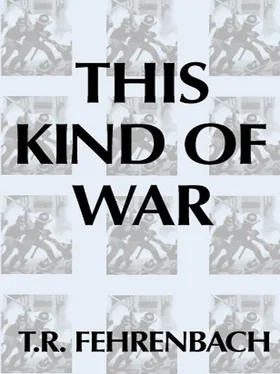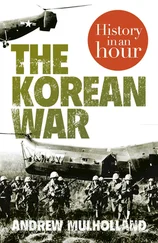Inside a hut, he found a five-day-old corpse, hanging by its heels—a symbol of the Communist determination to dominate, placed there as an example by the leadership.
And in a ditch, cowering, the paratroopers found Senior Colonel Lee Hak Ku, of the North Korean People's Army; they dragged him out, roughly, and pushed him on his way. Colonel Lee, who had expected to be killed, never afterward gave much trouble.
Nor did the other compounds, some of whom had witnessed the reduction of 76, and some of whom heard of it on the grapevine, when their own turn came.
Buried in 76, Boatner's men found two sets of plans. One was the defense plan by which the North Koreans had resisted movement.
The other was the plan for a mass breakout by the dedicated Communists of all compounds, set for 20 June 1952.
The plans called for the POW's to cut the wire, make for the hills, and slaughter everything in their path.
The plans, however, were eight days too late. For on 12 June 1952, with the compounds broken up, Brigadier General Bull Boatner was at last in command of Koje Island.
| Go to Table of Contents |
37
Summer, Winter, Spring, and Fall
The destiny of mankind is not decided by material computation. When great causes are on the move in the world … we learn that we are spirits, not animals, and that something is going on in space and time and beyond space and time, which whether we like it or not, spells duty.
— From a speech by Winston S. Churchill, Rochester, New York, 1941.
BY SUMMER 1952, as the rice began to ripen in the muddy brown paddies, and as the Korean valleys, which had been glacial in December, turned into malarial swamps, the only serious obstacle to a cease-fire was the problem of prisoners of war. The armistice line had been drawn, and by that agreement each side had relinquished any wholesale designs on the other's territory.
But now, with the Communist POW's once again under firm control, the Communist powers could not refute the fact that not more than 83,000 of the 132,000 of their personnel in U.N. hands would voluntarily return to their homelands, and this was a loss of face that they could not accept.
At Panmunjom, General Harrison had to face every kind of devious tactic, including the most flagrant lies and virulent abuse bordering on the personal. The Communists, who had deeply shocked the U.N. Command with their admission that they themselves held only 12,000 men—leaving thousands of Americans and 250,000 South Koreans, the latter mostly civilians who had disappeared during the Communist occupation unaccounted for—in addition to claiming torture and slaying of their people, also claimed that the U.N. held 40,000 more Communist POW's in secret.
Whatever heinous act the Communists committed, or intended to commit, they considered it good tactics to accuse the other fellow first.
Because U.N. POW's had died or disappeared by thousands in their own death camps, it was inevitable that they must accuse the U.N. of the same. But with the failure of planned mass breakout on Koje-do—which might have confused and concealed the real facts forever—it had soon become apparent to the world where the truth lay.
The International Red Cross, banned from Koje while Haydon Boatner cleaned up the island, returned there on 2 July. And while the IRC handed General Clark a stinging rebuke over the death and injury of certain POW's in the cleanup—which Clark shot back in similar language—neutral observers such as the IRC continued to uphold the U.N.'s word.
The Communists tried side gambits—in what was now primarily a propaganda war—such as the germ—warfare accusations. While it was true that wholesale epidemics, mainly typhus, raged over North Korea, this was due to the ravages of war, the destruction caused by the continual United States air bombardment, and the passage of huge, unwashed Chinese armies across a land lacking sanitation and medical facilities—not deliberate seeding of virulent bacteria by Americans.
The Communists were able to back up their accusations with statements by American airmen shot down over North Korea. Under great physical and mental pressure, a number of Americans confessed or otherwise acquiesced that the United States engaged in germ warfare.
While quite naturally scoffed at in the West, these claims—and their written and pictorial documentation—had great effect in the East.
After all, every Asian nation was quite aware of who had dropped the first nuclear bomb—and on whom.
One of the ironic and deeply tragic trends of the middle of the twentieth century was that just as the Westerners were gradually abandoning their own racial shibboleths and awarenesses, the rest of the world was adopting a virulent racial consciousness, which would, however unspoken, color all international policy.
When hemorrhagic fever—a particularly dreadful and at first fatal disease, causing bleeding from skin and eyeballs—attacked U.N. troops in western Korea, and a research laboratory was set up on a hospital ship off Korea, the ship was branded as a germ-warfare factory. General Harrison, a member of an old and distinguished Virginia family, and a quiet, Christian gentleman, was once provoked to say "that when you deal with Communists, you deal with common criminals."
General Harrison was wrong—and his error pointed up the dangerous weaknesses of the West in dealing with Communism. The charge of criminal, flung at a Hitler or an Eichmann, clings—because by the ethos of the society in which these men were born, they were criminal—but Communist society does not have a common ethos with the West. It cannot be evaluated by the cultural standards common to the West.
These vital differences made General Harrison's job at Panmunjom desperately difficult.
For the United States and its U.N. allies, to be true to their own concepts, could not in conscience do what the Communists now demanded as the price of peace: force their unwilling captives home at gunpoint.
There was some grumbling inside the United States, and more in Europe, at continuing the war for the sake of a few grubby POW's in Korean stockades, who probably didn't even know their own minds. But the United States Government never wavered.
And as the State Department reported, regardless of the moral issue, to force the POW's to return would be a propaganda defeat of the utmost magnitude; it would be surrender, and the significance of such breach of faith would not be lost throughout Asia.
Offering to return only those POW's who desired to return, the U.N. Command reiterated:
You have been repeatedly informed of the finality of our 28 April proposal … our stand is unshakable. We will not make further concessions. We are, however, always ready to explain the elements of our proposal.
The answer was no, but the door was still open.
Now the United Nations Command in Korea recommended to Washington that the POW's who refused repatriation be granted asylum as political refugees, and released in South Korea or on Taiwan, depending on their nationality. For as Edwin D. Dickinson, an authority on international law, wrote in the New York Times, … in the absence of treaty, the competence of states to grant asylum is unlimited.
States have unlimited right to grant asylum—but no obligation, if they do not choose. Washington rejected the proposal.
With both sides now intransigent, but still willing to talk, negotiations on the POW question droned through June and July.
The United Nations Command made further offers: to let the POW's be screened again by neutrals, and by the Communists themselves, in public. The Communist powers screamed foul to each proposal.
With growing discouragement, the U.N. negotiators began to recess frequently. In all, they threw out three alternative proposals, none of which, however, required an unwilling POW to return home if he did not so desire.
Читать дальше












